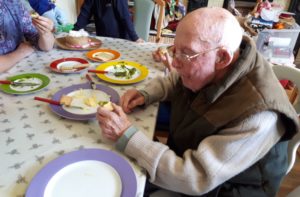‘My Nature’: A Training Toolkit for Care Home Staff

ENRICHEnabling Research in Care Homes
GUEST BLOG
‘My Nature’: A Training Toolkit for Care Home Staff
Noreen Orr, Research Fellow, NIHR CLAHRC South West Peninsula (PenCLAHRC), University of Exeter, Wendy Brewin, Creative Spaces Project Manager, Sensory Trust, and Ruth Garside, Senior Lecturer, University of Exeter Medical School
We are passionate about the natural environment and believe that nature is good for the health and wellbeing of older people living in care homes. For over 20 years, Sensory Trust has been developing a range of projects promoting sensory approaches to the natural environment in the belief that it brings social, health and wellbeing benefits. Four years ago, we collaborated on a project to synthesise qualitative evidence (words) on how older people (including those with dementia) describe their sensory engagement with the outside world.

We are passionate about the natural environment and believe that nature is good for the health and wellbeing of older people living in care homes. For over 20 years, Sensory Trust has been developing a range of projects promoting sensory approaches to the natural environment in the belief that it brings social, health and wellbeing benefits. Four years ago, we collaborated on a project to synthesise qualitative evidence (words) on how older people (including those with dementia) describe their sensory engagement with the outside world. The evidence told us that older people describe their sensory experiences of nature in terms of:
- Seeing, looking at and watching nature,
- ‘Being in’ nature, e.g. enjoying the birdsong in the garden,
- ‘Doing in’ nature e.g. gardening, and
- Pleasure and enjoyment, feeling connected and being part of ‘ordinary’ life.
However, older people living in residential/nursing care can experience barriers to accessing the outdoors. In fact, there is evidence from some research in Scotland that 50% of people with dementia in care homes never go out of the home, and another 25% go out rarely. There are a number of reasons why care home residents encounter barriers to enjoying nature and these include poor physical and mental health, loss of confidence, lack of interest and initiative, and weather. As care home residents are often dependent on the availability and willingness of staff to assist them to access nature, we need to support staff to improve residents’ sensory experiences of nature.
My Nature was a collaborative project between the University of Exeter and Sensory Trust, funded by the ESRC Impact Acceleration Award Fund, which aimed to develop an evidence-based training toolkit for care home staff to help residents engage with nature. One of the main aims was to pilot the training toolkit with care home staff and residents to understand the context in which it would be used and how best it could be implemented as part of routine care.
There are three elements to the toolkit:
- Evidence booklets: Book One contained detailed research evidence to show how nature improves health and wellbeing and Book Two contained the main points from the research evidence plus eight nature-based activities putting the evidence into practice.
- Nature-based activities: details on ‘how to do’ the activities, which were designed for residents with a range of interests and abilities and were named Nature Palettes, Nature Mapping, Hey Pesto!, Tea Tasting, Painting by Nature, Birds’ Nests and Nature Spotting (spotter cards for birds, butterflies and bugs).
- Wall chart: easy access information on timings, benefits, sensory engagement and related interests/hobbies to help find appropriate activities for individuals.
My Nature was designed to support care staff in their work and provide them with research evidence in a user-friendly format, encouraging them to read and act on it. We piloted the toolkit in two care homes in Cornwall for one month. One care home was in an urban location with 43 residents and the other was in a rural location with 16 residents. Both homes used their gardens and were keen to learn how to do more with nature-based activities, particularly by using nature indoors to support residents with reduced access to the gardens. At the start of the pilot, two workshops were held at each care home. These were led by Sensory Trust and demonstrated the nature-based activities accompanied by an explanation of how the activities reflected the evidence. The activities demonstrated in the workshops included Nature Palettes, Painting by Nature, Tea Tasting Party and Hey Pesto!.

A resident enjoying homemade pesto as part of the Hey Pesto! Activity
During the pilot we did four two-hour observation sessions to find out how the My Nature activities were used with residents. We also carried out seven interviews, involving the owner of one of the care homes and two mangers at the other, as well as the activities coordinators, a gardener and care staff. From these we learned how My Nature worked for the residents and how it worked for the staff. We have published key findings from our evaluation of the pilot of My Nature but some interesting highlights include how the My Nature activities succeeded in encouraging the residents to go outside into the gardens and how they helped generate conversation between residents, staff and families. Importantly, residents showed pleasure and enjoyment while participating in the activities and in what they created. Staff found that the activities could be planned in advance and could be used with the residents in a person-centred way. Care staff also talked about some of the challenges involved in using My Nature, particularly the task-orientation of their work in dealing with the physical needs of residents.
So what next? My Nature has been incorporated into Sensory Trust’s nature-based training programme for residential care, which aims to help them to grasp the important role nature can play in supporting quality of life for care home residents.
—
My Nature: A Training Toolkit was funded by the Economic and Social Research Council (ESRC) Impact Acceleration Award Fund and supported by the National Institute of Health Research (NIHR) CLAHRC South West Peninsula and the European Centre for the Environment and Human Health, University of Exeter Medical School.
—
Publications:
Orr, N., Wagstaffe, A., Briscoe, S. & Garside, R. (2016) How do older people describe their sensory experiences of the natural world? A systematic review of the qualitative evidence. BMC Geriatrics 16: 116